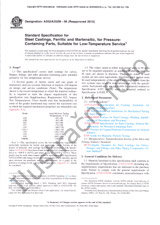Potřebujeme váš souhlas k využití jednotlivých dat, aby se vám mimo jiné mohly ukazovat informace týkající se vašich zájmů. Souhlas udělíte kliknutím na tlačítko „OK“.
ASTM D5286-20
Standard Test Methods for Determination of Transfer Efficiency Under General Production Conditions for Spray Application of Paints
Přeložit název
NORMA vydána dne 1.6.2020
Informace o normě:
Označení normy: ASTM D5286-20
Poznámka: NEPLATNÁ
Datum vydání normy: 1.6.2020
Kód zboží: NS-994987
Počet stran: 5
Přibližná hmotnost: 15 g (0.03 liber)
Země: Americká technická norma
Kategorie: Technické normy ASTM
Kategorie - podobné normy:
Anotace textu normy ASTM D5286-20 :
Keywords:
general production conditions, solvent emission, spray applied coatings, transfer efficiency, VOC, volatile content,, ICS Number Code 87.040 (Paints and varnishes)
Doplňující informace
| Significance and Use | ||||||||||||||||||
|
5.1 Subject to the limitations listed in 1.3, these test methods can be used to optimize paint application processes. |
||||||||||||||||||
| 1. Scope | ||||||||||||||||||
|
1.1 These test methods cover the determination of the transfer efficiency of spray-applied coatings under general plant conditions. Transfer efficiency is the ratio of paint solids deposited to the total paint solids used during the application process, expressed as a percent. 1.2 The transfer efficiency is calculated from the weight or volume of the paint solids sprayed and that of the paint solids deposited on the painted part. 1.3 Limitations include the ability to accurately determine the amount of paint solids deposited on the part and the capability of accurate measurement of the amount of paint sprayed. 1.4 The values stated in SI units are to be regarded as the standard. The values given in parentheses are for information only. Note 1: These test methods apply to general plant production
equipment and procedures. A method specific to automotive plants is
defined in Test Method D5066.
Note 2: The relationship between volatile organic compound
emission rates and transfer efficiency in automobile and light duty
truck topcoat operations, EPA 450/3-88-01, referenced in Test
Method D5066 does not apply
to general production facilities.
Note 3: A single-point transfer efficiency measurement may not
represent the entire process.
Note 4: The operator and the spray-application
equipment-operating conditions during the transfer efficiency
measurement should be representative of normal operating
conditions.
1.5 This standard does not purport to address all of the safety concerns, if any, associated with its use. It is the responsibility of the user of this standard to establish appropriate safety, health, and environmental practices and determine the applicability of regulatory limitations prior to use. Note 5: These test methods have not been adopted by federal regulatory agencies for demonstration of compliance with air pollution regulations such as VOC, HAPS, etc. 1.6 This international standard was developed in accordance with internationally recognized principles on standardization established in the Decision on Principles for the Development of International Standards, Guides and Recommendations issued by the World Trade Organization Technical Barriers to Trade (TBT) Committee. |
||||||||||||||||||
| 2. Referenced Documents | ||||||||||||||||||
|
Doporučujeme:
Aktualizace technických norem
Chcete mít jistotu, že používáte pouze platné technické normy?
Nabízíme Vám řešení, které Vám zajistí měsíční přehled o aktuálnosti norem, které používáte.
Chcete vědět více informací? Podívejte se na tuto stránku.




 Cookies
Cookies
